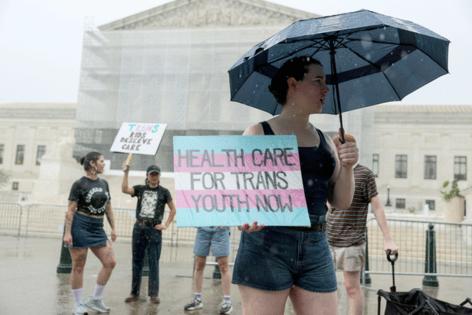Commentary: Ending LGBTQ+ health research will leave science in the dark
Published in Op Eds
In recent months, the Trump administration has terminated thousands of federally funded medical research grants, gutting $9.5 billion in critical health science efforts. More than half of those cuts — 1,246 grants worth $5.5 billion — targeted studies focused on LGBTQ+ health. These cuts don’t just reflect shifting policy priorities. They also risk limiting the scientific insights that inform clinical care and support the health of all Americans.
Beginning in February, thousands of scientists received abrupt notices terminating funding for vital research involving LGBTQ+ populations. The justification?
Their research was deemed “based primarily on artificial and nonscientific categories, including amorphous equity objectives.” One letter even claimed that “research programs based on gender identity are often unscientific, have little identifiable return on investment, and do nothing to enhance the health of many Americans.”
The grants that were terminated underwent stringent peer review prior to funding and covered a wide range of important issues — from Alzheimer’s disease and breast cancer to caregiver well-being and school safety. In many cases, the common factor cited in their termination was simply the inclusion of LGBTQ+ populations within the research scope.
When groups of people are excluded from research, it sends a message about whose health is prioritized. The disproportionate elimination of LGBTQ-focused research is more than a policy decision or political maneuver. It weakens the foundation of evidence-based care. Research is essential to understanding health risks, evaluating treatments and improving care for people who need it most. When research funding is withdrawn, medical care falls behind, and collectively we all suffer.
LGBTQ+ people make up nearly 10% of the U.S. population, and long-standing research shows they face significant health disparities. Many of these gaps remain poorly understood because of limited studies. For example, lesbian, gay and bisexual populations experience higher rates of substance use disorders, often beginning in adolescence. LGBTQ+ adults are three to six times more likely to attempt suicide than their heterosexual, cisgender counterparts. The incidence of several cancers is also higher, but we don’t have a comprehensive understanding of why. Crucial studies investigating possible causes and risk factors were among those recently terminated.
We’ve seen the consequences of neglecting health disparities before. For decades, medical problems unique to Black Americans were understudied and unsolved. For example, the false assumptions that hypertension can be managed the same across racial groups delayed important insights and limited the development of tailored treatment. These delays resulted in worse cardiovascular outcomes for Black patients compared with their white counterparts.
Another historical example of the dangers of excluding subpopulations from research is the Food and Drug Administration’s 1977 decision to ban women of childbearing age from clinical drug trials. This guideline created a selection bias against women across the research world and slowed progress in understanding their unique health needs. Though the ban was lifted 16 years later, we remain behind in our understanding of cardiovascular disease management in women, and closing that gap will require decades of focused research.
And now the Trump administration is repeating this pattern by deliberately excluding a subgroup of the population from research. The neglect of health disparities among LGBTQ+ patients will continue, to their great detriment. The withdrawal of grant funding specific to this group risks condemning millions of people to dangerous health disadvantages for years to come. This move diminishes the pool of researchers dedicated to solving health problems that affect the LGBTQ+ community, as they are forced to follow other funding lines. Lack of research attention to communities with unique needs, such as the LGBTQ+ population, risks increased marginalization and exacerbates stigma.
Stigma has long shaped how public health crises are recognized and addressed. In 1981, U.S. health officials became aware of an emerging disease they called Gay-Related Immune Deficiency. Contracting this disease came with both a death sentence and the stigma of having the “gay plague.” The condition was eventually understood to be a serious public health issue affecting a broad range of people and was renamed HIV/AIDS.
Yet it took nearly five years before President Reagan made major funding available for HIV/AIDS research. Delays in funding, in part because of stigma, slowed scientific progress and contributed to the spread of the epidemic. To ignore the issues facing any one population is to risk potential harm to all of society.
All people deserve quality, evidence-based health care that addresses their unique physical, psychological and social needs. That is precisely why medical research is a foundational pillar of a functioning health care system. Without it, our understanding of diseases and treatments is dependent on outdated, extrapolated or incomplete evidence — which causes harm.
By withholding funding for research that includes LGBTQ+ participants, the Trump administration is sending a message that the health of nearly 32 million Americans simply isn’t worth the investment of federal dollars. The cost of that decision will be measured in suffering, inequity and lives lost — not just within the LGBTQ+ community, but across the entire health care system.
_____
Haley Stepp is the research program manager at the George Washington University School of Nursing. Kathleen Griffith is a professor at the George Washington University School of Nursing and School of Medicine and Health Sciences.
_____
©2025 Los Angeles Times. Visit at latimes.com. Distributed by Tribune Content Agency, LLC.

























































Comments